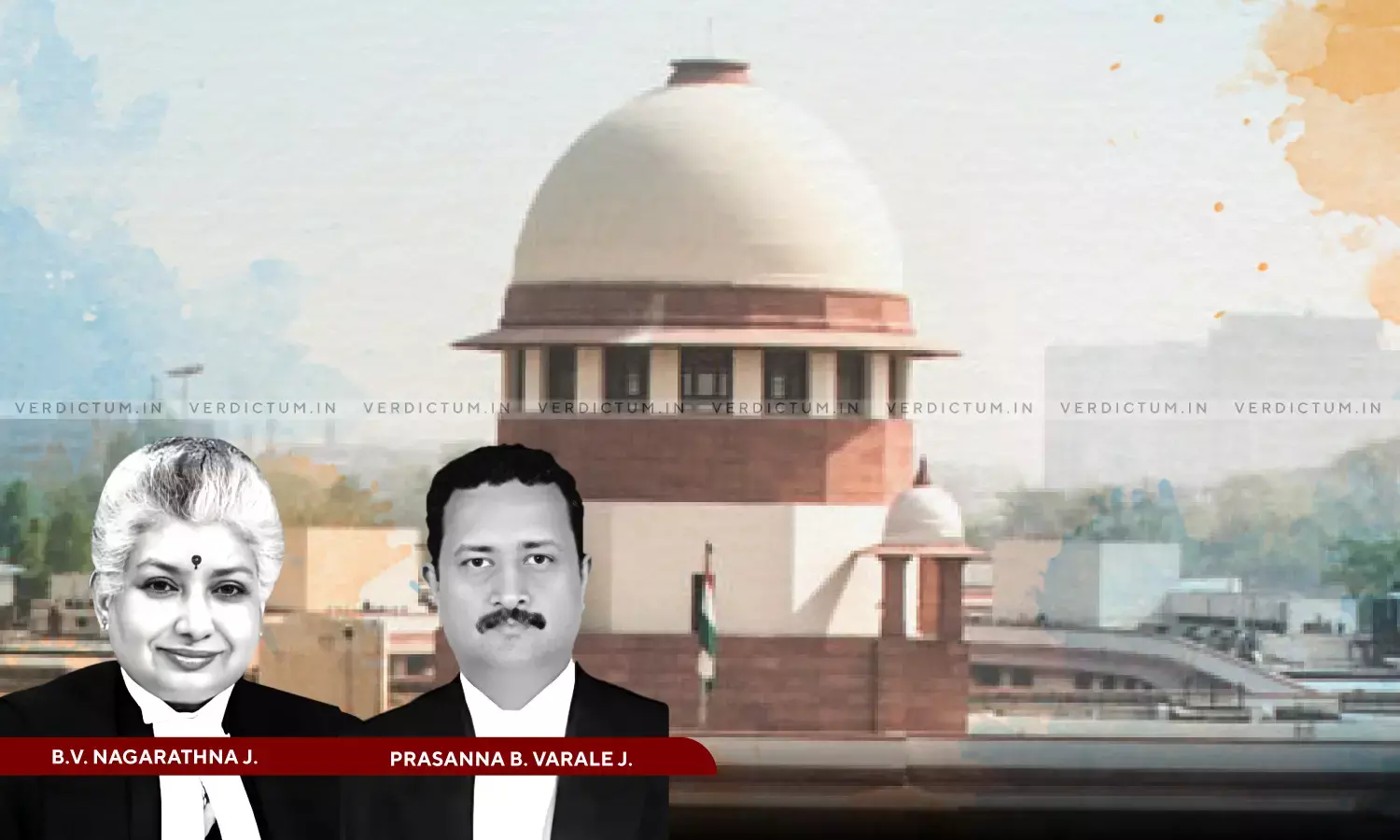State's Duty To Facilitate Nursing Mothers’ Right To Breastfeed; Citizens Must Not Stigmatize Breastfeeding In Public & Workplaces: Supreme Court
The Supreme Court held that breast-feeding is an integral component of a child’s right to life and so is a mother’s right to breast-feed her child.

Justice B.V. Nagarathna, Justice Prasanna B. Varale, Supreme Court
The Supreme Court held that the State has the duty to facilitate a nursing mother to exercise her right to breast-feed her children, and therefore, the practice of breastfeeding in public and workplaces should not be stigmatised.
The Petitioner, an NGO named Maatr Sparsh An Initiative by Avyaan Foundation, filed a PIL seeking directions for the construction of feeding rooms, crèche and child-care facilities at public places. The Court held that breast-feeding is an integral component of a child’s right to life and “as the right of a child to be breast-fed is inextricably linked with the mother, she also has the right to breast-feed her child.”
A Bench of Justice BV Nagarathna and Justice Prasanna B Varale held, “It would not be wrong at this instance to remind the citizens of this nation of their duty to “renounce practices derogatory to the dignity of women”, as enshrined in Article 51A(e) of the Constitution of India. Over and above the duty of the State to facilitate the exercise of the right of nursing mothers to breast-feed their children, the citizens must ensure that the practice of breastfeeding in public places and at workplaces is not stigmatized.”
The Advocate Abhimanue Shrestha appeared for the Appellant, while Deputy Government Advocate N. Visakhamurthy represented the Respondents.
Brief Facts
It was submitted that depriving any child of mother’s milk due to lack of basic facilities at public places infringes the fundamental right of a child and the mother. They further submitted that in today’s scenario, where women are equally participating in the growth of the nation and are stepping outside their homes in large numbers, child-care facilities must be available in the public spaces and premises.
Court’s Observations
The Court emphasized that breastfeeding is integral to a child’s right to life and development under Article 21 of the Constitution.
The Bench remarked that “the health of infants cannot be viewed in isolation. Rather, it has to be seen as being linked with the status of women and their roles as mothers and as contributors to social and economic development of the nation. As the right of a child to be breast-fed is inextricably linked with the mother, she also has the right to breast-feed her child. Consequently, this means that the State has the obligation to ensure adequate facilities and environment to facilitate mothers to breast-feed their children.”
The Court referred to Articles 14, 15(3), 39(f), and 47 of the Constitution, reinforcing the State’s duty to ensure the well-being of children and mothers.
The Bench took note of the communication addressed by the Ministry of Women and Child Development incorporating, inter alia, the directions sought by the Petitioner including:
- “The installation of Sanitary Pad vending machines and incinerators in washrooms addresses the fundamental menstrual hygiene needs of female employees.
- Allocating space for feeding rooms, restrooms and yoga rooms. These facilities cater to the physical and mental health needs of female employees that will also ensure compliance of the provisions of the Maternity Benefit (Amendment) Act, 2017. This Act mandates support for women during their post-delivery period.
- Incorporating at least one creche facilities in every public building having 50 or more female employees to support working mothers, promoting gender equality and facilitating the retention and advancement of talented female professionals.”
Regarding the same, the Bench stated that “we find that the advice for setting up of the aforesaid facilities at public places is for the purpose of ensuring privacy and comfort of nursing mothers, who have infants, and for the benefit of infants. The above, if acted upon by the State Governments/Union Territories, would go a long way in facilitating nursing mothers and infants so that their privacy is ensured at the time of feeding the infants.”
Consequently, the Court ordered, “We therefore, direct respondent no.1/Union of India to incorporate the aforesaid advisory in the form of a reminder communication to the Chief Secretary/Administrator of all State Governments/ Union Territories along with a copy of this order so that the States/Union Territories would comply with the aforesaid advisory issued, which would facilitate women, who are nursing infants particularly in public places.”
“Insofar as the public buildings which are at the stage of planning and construction, it may ensure that sufficient space is reserved for the purposes, referred to above, in the form of childcare/nursing rooms,” the Bench directed.
Cause Title: Maatr Sparsh An Initiative By Avyaan Foundation v. Union Of India & Ors. (Neutral Citation: 2025 INSC 302)

